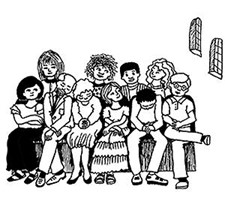MISCONCEPTIONS
Let’s have someone else ask for the money!

Fund raising consultants are well paid because the people that hire them believe they will do all the unpleasant work for them. In reality, these consultants provide assistance preparing materials and training volunteer solicitors, but local volunteers actually ask for the gifts. Fund raising consultants do not have a group of wealthy friends who need help making contributions. Being responsible for raising $1,000,000 when you have no idea of where to start can be very intimidating, thus many campaigns start by hiring a consultant to walk them through the process. That would be fine if the path the consultant took was the best possible approach. Often that is not what happens. If you have the discipline to follow the steps outlined in this website, you will amaze yourself at how successful you can be. You do have to follow all the steps outlined in this website, but you also have to follow all the right steps to bake a cake. If you follow the recipe, you will have a nice cake; if you change a few details that you do not think are necessary, problems can arise.
I was once offered a $1,000,000 fee if I would simply raise $2,000,000 so the client could have $1,000,000. I did not accept that generous offer because the client did not understand the role of a professional fundraising consultant.
Asking people for money just makes them mad.

Many church splits can be traced back to someone getting offended by a fundraising ask or response. A possible unspoken response to an ask could be “You have no right to ask me for that much since you do not know the private details of my finances”.
A possible response to an ask can be equally as offensive if the solicitor says to themselves “This cheapskate should be giving twice as much as the number he just proudly stated”.
Both of these situations are a shame since both the ask and the offer are intended to assist the church. If the solicitation was completely between the prospect and God, no one’s feelings would get hurt. God is better at this than us; we should let Him do it.
Campaigns are a lot of work and take too long.

This is definitely true if you use the Traditional One-On One approach outlined above. Compare that approach to a congregation of 200 with 10 home groups that meet weekly. Everyone is notified multiple times that our capital campaign will be done on the third week of next month. Case Statement brochures explaining the need are given to everyone well in advance. Personalized invitation brochures are sent to each family. MANY reminders are given for six weeks prior to the home meetings. Pledge cards are in the church safe with an armed guard on duty (well maybe without the armed guard, but just as seriously controlled). The home group meetings are completed. Pledge cards are distributed, completed, sealed in individual envelopes and the envelopes are collected at the end of each Prayer -Oriented Home meeting
The capital campaign for these meeting attenders is over and done. Everyone is still happy at the Victory Praise Celebration, and everyone is amazed at how easy and successful the campaign has been. This website will cover all the details, and they are important, but it really is that easy!
What I give is none of your business

Most people will not state it that bluntly, but this is what they will be thinking. The giving decision and amount can be kept confidential if the fundraising discussion is between the prospect and God.
The completely confidential nature of the Prayer-Oriented Home-Group approach eliminates this concern.
It is also very easy to give yourself reasons to say no to a fellow church member; it is much more difficult to tell God why your personal gift must be small.
I don’t want to turn in my pledge card now – I’ll get it to you later.

Part of the success of the Prayer-Oriented Home-Group Campaign approach is the creation of a decision point at the end of the home group meeting. The minister and weekly congregational announcements will prepare members for the decision point at the end of the home group meeting. Prospects are reminded several times that their giving decision is between them and God. A church leader’s review of the Case Statement brochure at their meeting and a viewing of the visual presentation will help encourage the prospect in their decision. Most importantly they have discussed this issue with God several times. They have also been reminded far in advance, and many times, that the pledge cards, in sealed envelopes, will be collected at the end of the meeting. A successful campaign will literally remind the prospects dozens of times that they are to turn in their pledge cards at the end of the home group meeting. Even if you have given this reminder 10 times, someone may still say “I didn’t know we had to turn in the cards tonight”. Cards are returned in sealed envelopes so confidentiality is maintained. If they have received several reminders, they cannot claim ignorance. Some people would rather not give because it will cost them money, but they also do not want to say no to God. If they feel pressure, it is not from a volunteer solicitor as the giving decision has always been between the prospect and God. This point is key to the success of the campaign. If they absolutely refuse to turn in their sealed pledge at the end of the meeting, remain positive and try to keep them from influencing the entire group.
If everyone else in the home group turns in their sealed envelope except this one prospect your campaign will be fine. If their action affects the entire home group, and then other home groups, the campaign will fail. This detail really is that important.
We like this approach, but we want to streamline a few things out and add a few in.

It is human nature to want to improve any recommended approach. I do not claim to be a genius, but I have been involved in thousands of small group meetings. Like everyone else, I have tried to make a few adjustments which provided me with a good learning experience. Please learn from my mistakes rather than repeating them. One big advantage of following this approach is that I have already made mistakes that you can avoid. Just remind your congregation, about three times as often as you think would be appropriate, that pledge cards in sealed envelopes are to be handed in at the end on each meeting. Then also guard pledge cards like gold until the end of the video presentation at your meeting.
I know some friend has an idea to make the process even better, but you will benefit if you resist this temptation.
Could we just have one big meeting some Sunday morning?

The approach of one big meeting has been tried many times, but usually falls short for the following reasons:
- There is nothing special about a Sunday morning service with a different sermon topic.
- Many One-On-One Campaigns incorporate a special Sunday appeal as part of their overall approach, but it frequently confuses the fundraising effort more than assisting it. The congregation realizes no decision point has been created, thus there is no implied need to make a decision concerning your gift that Sunday. Typical results are so incomplete that a One-On-One follow-up is needed.
- The need for a One-On-One follow-up eliminates the confidential nature of the Prayer-Oriented Home-Group approach.
- It is virtually impossible to tell who has been contacted and who has not. This sets up embarrassing situations and makes accurate record keeping impossible.
- Without the confidential emphasis on personal pray, the campaign becomes a discussion between prospects and volunteer solicitors.
- It has been said “Big meetings get small gifts – Small meetings get big gifts
- Learn from the experience of many others – “Let’s all just give our capital campaign gift next Sunday” approach does not work.
What could go wrong?

Actually, very little could go wrong. Do everything humanly possible to make sure everyone understands that completed pledge cards are to be turned in at the end of each meeting. Also keep all blank pledge cards in a place as secure as you would use to store $1,000,000 in cash. Complete all the other details in this website and you will be amazed at the result.Please go to the appendix titled “What Could Go Wrong (In Detail)” and keep a copy of the list of items you could forget.
What if the campaign does not work?

Of course, it is possible your church is not ready to complete a large building program. There is nothing magic about capital campaigns. They are based on the idea that your congregation has the ability and commitment to generate sufficient funds to complete the project. Billionaires may give millions to causes they are interested in, but they are probably not members of your congregation. If you are not ready for a large capital campaign, use creative approaches to grow your congregation and try this process again in a few years. You can always return gifts and pledges if you see the campaign will not be successful. Just be honest and maintain credibility with your donors and try again latter when success is more feasible.
Thus far you have received a general overview of how a Prayer-Oriented Home-Group Capital Campaign approach would work and why it is by far the best approach. A Prayer-Oriented Home Group Capital Campaign is still a major undertaking with numerous details, thus a good understanding of all the details is needed to achieve the optimal result. The next section of this website will cover all these details.